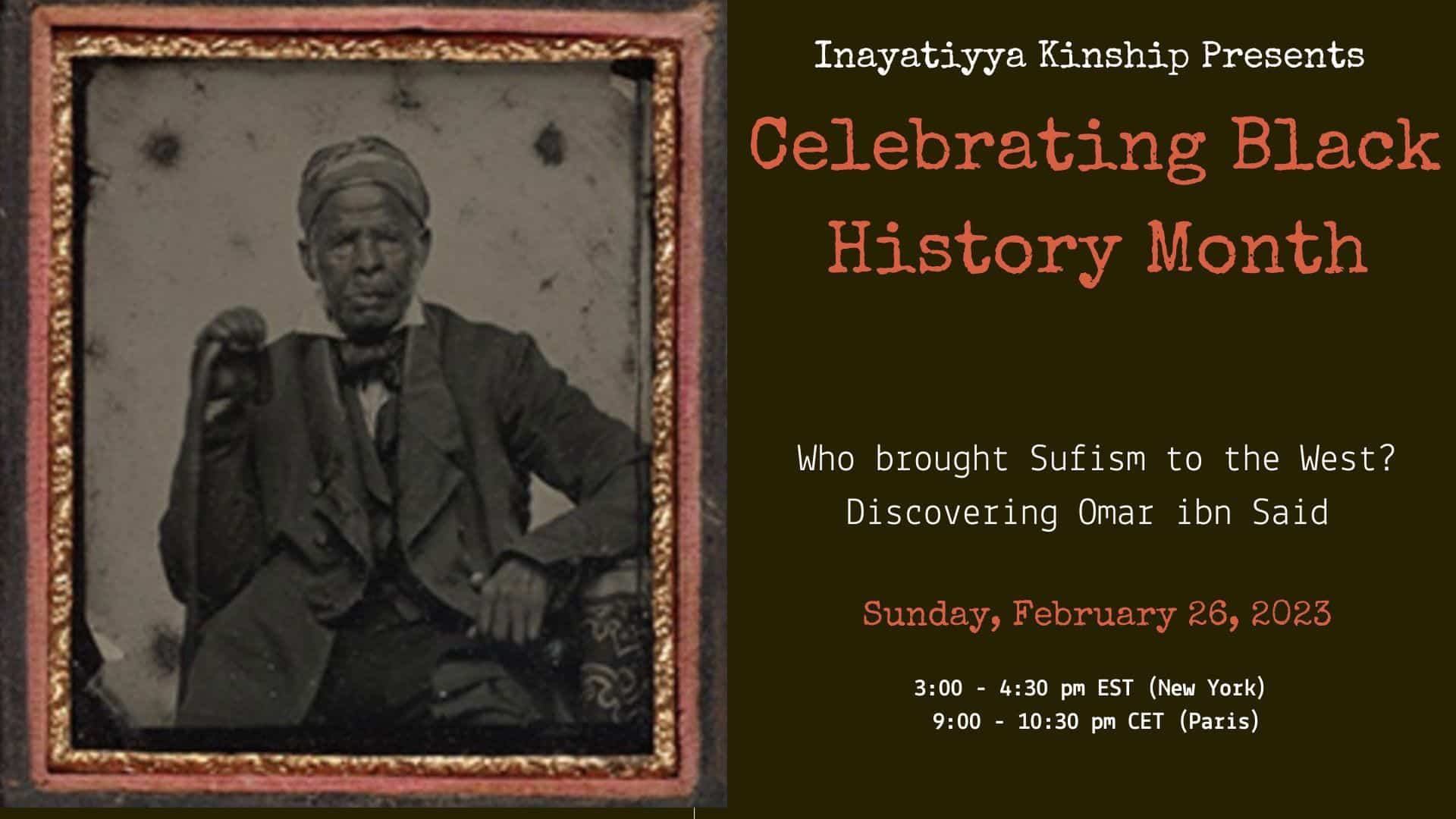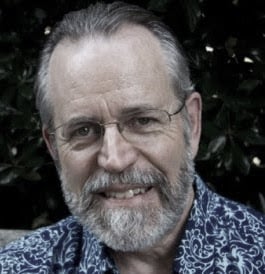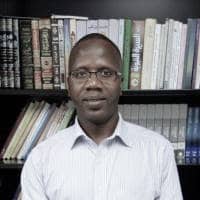
Celebrating Black History Month
Who Brought Sufism to the West? Discovering Omar ibn Said
Sunday, February 26, 2023
3:00 pm – 4:30 pm EST (New York); 9:00 – 10:30 pm CET (Paris)
The Inayatiyya teachings herald from Sufi traditions rooted in Persia and India. Join us for this unique opportunity to explore parallel Sufi teachings from West Africa. Before Hazrat Inayat Khan arrived in North America, in the early 1800s an enslaved Muslim man, Omar ibn Said, arrived on this continent. New scholarship unveils his Sufi connections!
Omar ibn Said was born into a well-educated family around the year 1770 in Futa Toro, in contemporary Senegal. In his thirties he was kidnapped, enslaved, and transported to Charleston, South Carolina. He escaped from his first enslaver and was later imprisoned in Fayetteville, North Carolina. Jim Owen, brother to the governor of North Carolina, purchased Said, and he spent the next fifty-three years of his life with the Owens. Said went on to write a series of manuscripts in Arabic which draw broadly from a range of theological sources, defying the American misconception that African slaves were uneducated and uncultured. Said is famous for being the only known enslaved person in the United States to write an autobiography in Arabic. His writings attest to robust educational traditions and systems in West Africa, as well as to enslaved peoples’ resistance to the conditions of the American South. Said died in 1864, just a year before the American Civil War ended.
Scholars Dr. Carl Ernst and Dr. Mbaye Lo will share the findings of their research into Omar ibn Said’s life including a sermon in verse by Abu Madyan, the most popular Sufi saint of North Africa; a theological poem by a disciple of the great Al-Sanusi; and an esoteric poem on the divine names from Egypt, along with works on Maliki law and theology.
Forthcoming in August from UNC Press, Dr. Ernst and Dr. Lo’s book, I Cannot Write My Life: Islam, Arabic, and Slavery in Omar ibn Said’s America, proposes an entirely new interpretation based on the first complete translation of his writings, in which the authors discovered Omar’s quotations from Arabic texts on Sufism and Islamic theology that have gone unrecognized until now.
Our program is from 3:00 – 4:30 pm ET (New York) via Zoom, and is being hosted by the Inayatiyya Kinship Activity. All are welcome. Translation for this program into French and German is available if registered by Friday, February 24th.
Suggested donation is $15. If you have any questions about the content of this program, please email kinship@inayatiyya.org. If you have registration questions, please email astana@inayatiyya.org.
Date
- Feb 26 2023
- Expired!
Time
EST- 3:00 pm - 4:30 pm
Local Time
- Timezone: America/New_York
- Date: Feb 26 2023
- Time: 3:00 pm - 4:30 pm
Cost
- $15
Location
Organizer
Language: English
Speakers
-
 Carl W. Ernst
Carl W. ErnstCarl W. Ernst, PhD, is an academic specialist in Islamic studies, with a focus on West and South Asia and a former professor at the University of North Carolina Chapel Hill where he served as the William R. Kenan, Jr., Distinguished Professor Emeritus of Islamic studies at the Department of Religious Studies. He was the founding director (2003-2022) of the UNC Center for Islamic and Middle East Studies. He has received research fellowships from the Fulbright program, the National Endowment for the Humanities, and the John Simon Guggenheim Foundation, and he has been elected a Fellow of the American Academy of Arts and Sciences. His research, based on the study of Arabic, Persian, and Urdu, has been mainly devoted to the study of three areas: general and critical issues of Islamic studies, premodern and contemporary Sufism, and Indo-Muslim culture. Dr. Ernst is the author of many books and articles. Ernst’s recent book, which won the inaugural Global Humanities Translation Prize from the Buffet Institute, is a translation from the Arabic, Hallaj: Poems of a Sufi Martyr (Northwestern University Press, 2018). His scholarly work is summarized by two collections of essays: It’s Not Just Academic: Essays on Sufism and Islam (2017), and Refractions of Islam in India: Situating Sufism and Yoga (2016). His other publications, which have received several international awards, include an edited volume on Islamophobia in America (Palgrave-Macmillan, 2013); How to Read the Qur’an: A New Guide, with Select Translations (UNC Press, 2011) and more. https://carlwernst.web.unc.edu/
-
Mbaye Lo
Mbaye Lo, PhD, is associate Professor of the Practice of Asian and Middle Eastern Studies and international comparative studies at Duke University. Originally from Senegal, Lo completed his undergraduate and graduate training in classical Arabic language and literature at the International University of Africa, Khartoum and Khartoum International Institute for Arabic Language, Sudan. He received an MA in American history from Cleveland State University where he also earned his PhD from the Maxine Goodman Levin College of Urban Affairs with a dissertation on Re-inventing Civil Society- Based Governance in Africa: Theories and Practices. Professor Lo is the author and editor of nine books in both English and Arabic that examine the intersection of intellectual and social discourse of Arabic/Islamic and African cultures. He has written widely on political Islam, Arabic literary traditions in West Africa, and ideas of civil society and governance. https://scholars.duke.edu/person/mbaye.lo

